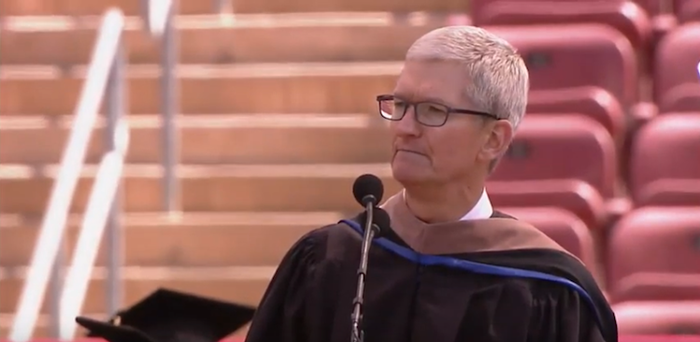
Tim Cook stands at the helm of one of the largest and most valuable public companies in the world. He’s been the CEO of Apple for nearly eight years, but he didn’t feel ready for the job when he took it on, he told the class of 2019 at Stanford University on Sunday, June 16, and that’s to be expected.
“Your mentors may leave you prepared, but they can’t leave you ready,” he told graduates.
It’s a lesson he learned firsthand when he took the reins from his predecessor, Steve Jobs, just weeks before Jobs died. By then Cook had already put in more than a decade at the company, with six of them spent as COO, but the transition was nevertheless a difficult one.
“When Steve got sick, I had hardwired my thinking to the belief that he would get better. I not only thought he would hold on, I was convinced down to my core that he’d still be guiding Apple long after I myself was gone,” Cook said. “When he was gone, truly gone, I learned the real visceral difference between preparation and readiness. It was the loneliest I’ve ever felt in my life by an order of magnitude.”
People were watching and their expectations were high. Cook could sense as much. “When the dust settled, all I knew was that I was going to have to be the best version of myself that I could be,” he said. He also knew, however, “that if you got out of bed every morning and set your watch by what other people expect or demand it’ll drive you crazy.”
It’s only fitting that this was a lesson that came from Jobs, who famously told Stanford’s class of 2005 that “your time is limited, so don’t waste it living someone else’s life.” Standing in the same spot 14 years later, Cook paid homage to his own mentor, who left him prepared but not ready, yet certain that he should forge his own path instead of hewing to others’ expectations or blindly emulating those who came before him.
Here was a giant in the world of business and technology admitting to the world how daunting it was to take on that role and reminding everyone else how normal it is to feel that way. No matter what field you’re in or what next step you’re embarking on, moving up is not only exciting, but also intimidating. Your bosses and mentors can teach and guide you, but then it’s your job to learn from your own experiences and develop your own way forward.
“Graduates, the fact is when your time comes—and it will—you’ll never be ready. But you’re not supposed to be,” Cook said. “Find the hope in the unexpected. Find the courage in the challenge. Find your vision on the solitary road.”
He urged people to spend their time creating and building in service of some greater cause they believe in. That, presumably, is what will help guide you even when you’re not sure you’re ready for what lies ahead—and help you face the challenge with integrity. While Cook’s speech offered comfort and encouragement for anyone figuring out their path, it also came with a warning.
“Too many seem to think that good intentions excuse away harmful outcomes, but whether you like it or not, what you build and what you create define who you are,” he said. “If you want to take credit, first learn to take responsibility.”
In other words, fear is natural, but that doesn’t mean you can be careless. So when you don’t feel ready, remember that even a famous CEO felt that way too. His advice? Let yourself chart your own course, have the “courage to think things through,” and take responsibility as readily as you take credit.